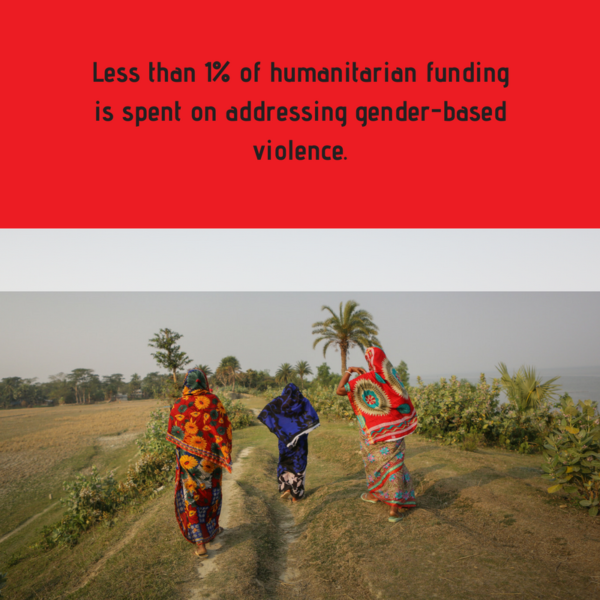1. Disasters and protracted conflicts are happening with increasing frequency and intensity every year.
CNBC called 2017 ‘the year of disaster’ because of catastrophic floods, wildfires and earthquakes affecting millions across the globe. There are over 145 million people in nearly 40 countries who are affected by humanitarian crisis, with women and girls making up just over half of those in need of urgent assistance.
2. Women are disproportionately affected both as a cause and consequence of existing gender inequalities and injustice.
They are 14 times more likely to die in a disaster than men (UNDP 2013), yet a tiny portion of UN crisis response funding is allocated to programs that considered the unique needs and rights of women.
3. Women have a fundamental right to participate in and influence the decisions and institutions that affect their lives, which includes during a disaster.
These rights are enshrined in a number of international legal frameworks, including the UN Convention on the Elimination of All Forms of Discrimination Against Women (1979) and UN Security Council Resolution 1325 (2000).

4. Disasters and conflict increase women’s vulnerability.
Disasters and conflict like those in Syria, Bangladesh and Haiti increase women’s vulnerability to violations and denial of human rights, including exclusion from decision-making and access to resources. Women are frequently consistently underrepresented, or not represented at all, in places where all the decisions are made during a crisis or conflict.
5. Women are not just ‘victims’.
While women are disproportionately affected by emergencies, we need to go beyond characterising women as ‘vulnerable’ and ‘victims’ and see them as the fearless changemakers and leaders that they are. Through our Women’s Resilience Index research, we found that this conceptualisation of women as victims in disasters precludes them from being considered as active agents of change and stands in the way of women fulfilling their human rights. This needs to change.
6. Humanitarian crises can catalyse change.
They can create potential spaces to challenge the status quo, and build back better in ways that transform gender relations and empower women over the longer term. ActionAid’s experience has shown that building women’s leadership in emergency preparedness fosters a sense of self-confidence and empowerment, which can transform gender power relations over the long-term.
7. When a woman is placed at the centre of emergency response, she rebuilds more than just buildings.
She builds resilience for herself and her community, the capability to defend her rights, and leadership skills that last a lifetime.
8. Women bring invaluable and unique contextual knowledge, skills, resources and experiences.
Women bring unique things to emergency preparedness, response and resilience building, contributing to the emerging evidence base that women’s leadership contributes to better disaster preparedness and risk reduction; more efficient and effective humanitarian response; and inclusive and sustainable peace building and conflict resolution in communities.
9. ActionAid pioneered women-led emergency response.
Ten years ago we pioneered the first women-led emergency response initiative and have been using this approach in local communities around the globe ever since. We have supported thousands of women in crisis from Bangladesh to Vanuatu and from Kenya to Haiti to rise up, claim their rights and take positions of leadership long after the emergency has passed.
10. Women will rebuild the world.
Last but not least, we firmly believe that women will rebuild the world. And we will be there, to support them, every step of the way. This looks like investing in women’s leadership in emergency preparedness and resilience building; utilising women’s unique skills and knowledge in humanitarian response; supporting women’s mobilising and organising efforts; increasing women’s access to resources through targeted economic empowerment programming; collecting gender disaggregated data; distributing resources to women and their organisations; and raising awareness of women’s rights communities before, during and after disaster strikes.
Women around the world are transforming the humanitarian agenda and turning crisis response on its head. But we can’t do it alone – we need people who share our vision. People who make change, not wait for it.
Are you one of them? Arise for women in emergency this World Humanitarian Day.
Join the revolution